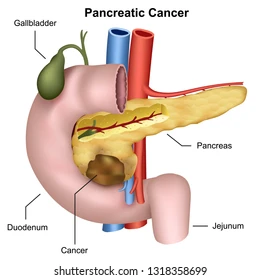Pancreatic Cancer View
Pancreatic Cancer: Understanding the Risks, Recognizing the Signs
When we consider our vital organs, the heart, brain, and lungs usually come to mind. However, there’s an unsung hero working quietly behind the scenes: the pancreas. This six-inch-long gland that’s tucked behind your stomach is critical for digestion and blood sugar regulation.
It releases enzymes that are helpful in digestion and produces insulin. Insulin is very important for regulating your blood sugar levels. In a nutshell, pancreas is a dual-function organ that plays a vital role in maintaining our overall health.
Reaching out to Dr. Aditya Kulkarni , a known Expert in Pancreatic Cancer Treatment in Pune , might ease your anxiety if you’re Feeling uncertain about the possibility of having pancreatic cancer. You will Receive treatment, to deal with your particular Problems.
- Age: Most people diagnosed with pancreatic cancer are over 45. Talking about the average age of diagnosis, it’s 70.
- Gender: Generally, men are slightly at a higher risk of getting pancreatic cancer as compared to women. But gender is not a definitive risk factor.
- Smoking: If you are a smoker, you are about twice at the risk to developing pancreatic cancer as compared to non-smokers. So, quite smoking if possible or at the least, try to reduce.
- Obesity: Obese or overweight individuals are more prone to developing this disease. So try and manage your weight efficiently.
- Pancreatitis: Chronic inflammation of the pancreas (pancreatitis) can increase the risk of pancreatic cancer.
- Family history: A family history of pancreatic cancer can increase the risk. Don’t leave your health to chance. Dr. Aditya Kulkarni, a leading gastrosurgeon at Oasis Clinic in Pune, is here to help you understand and manage pancreatic cancer risk factors. Act today to safeguard your tomorrows.


- Healthy Eating: Strive for a diet that is rich in fruits, veggies, lean proteins, and whole grains. These foods are not only nutritious but can help keep your weight in a healthy range.
- Say No to Smoking: If you’re currently a smoker, kicking the habit can drastically cut your pancreatic cancer risk.
- Be Mindful of Alcohol:Heavy alcohol use can lead to conditions like chronic pancreatitis, which increases the risk of pancreatic cancer.
- Stay in Motion: Just as we discussed earlier, regular physical activity can keep insulin levels balanced and help you maintain a healthy weight.
- Jaundice, or yellowing of the skin and eyes
- Pain in the upper abdomen or back
- Unexplained weight loss
- Nausea and vomiting
- Dark urine
- Stools that are greasy or unusually light in color
- Itchy skin
- Blood clots
- Fatigue
Confronting Pancreatic Cancer: The Arsenal of Treatments.
Once a pancreatic cancer diagnosis is made, your medical team will discuss the best treatment options based on your unique situation. Let’s review some of the commonly employed strategies:
Surgery: If the cancer is localized within the pancreas, removing it surgically might be an option.
Chemotherapy: This drug treatment works systemically to destroy cancer cells.
Radiation Therapy: Using high-energy beams, this treatment seeks out and destroys cancer cells.
Targeted Therapy: This innovative approach zeroes in on specific abnormalities within the cancer cells.
Immunotherapy: By harnessing your immune system’s power, this therapy helps your body fight back against the cancer.
Take a Moment to Call Someone You Care About
Dealing with pancreatic cancer is nothing short of challenging, but remember, you’re not alone. Armed with knowledge, healthful choices, and a watchful eye for early symptoms, you’re more equipped than you might realize. Plus, we’re here to help. Our team of experts is ready and waiting to offer support, answer your questions, and guide you through your journey towards better health. Don’t hesitate! Reach out to our team today for more insights and personalized advice. Your wellbeing is our main concern, and we’re dedicated to helping you navigate your path to health.Wrapping up

Dr. Aditya Kulkarni
MS, DNB, FRCS, MCh (Surgical Gastroenterology & GI Oncology)
Dr. Aditya Kulkarni is a Consultant of Laparoscopic and Robotic Gastrointestinal, Hepato-biliary-pancreatic, and Cancer Surgeon at the Renowned Oasis Surgery Clinic Pune.
